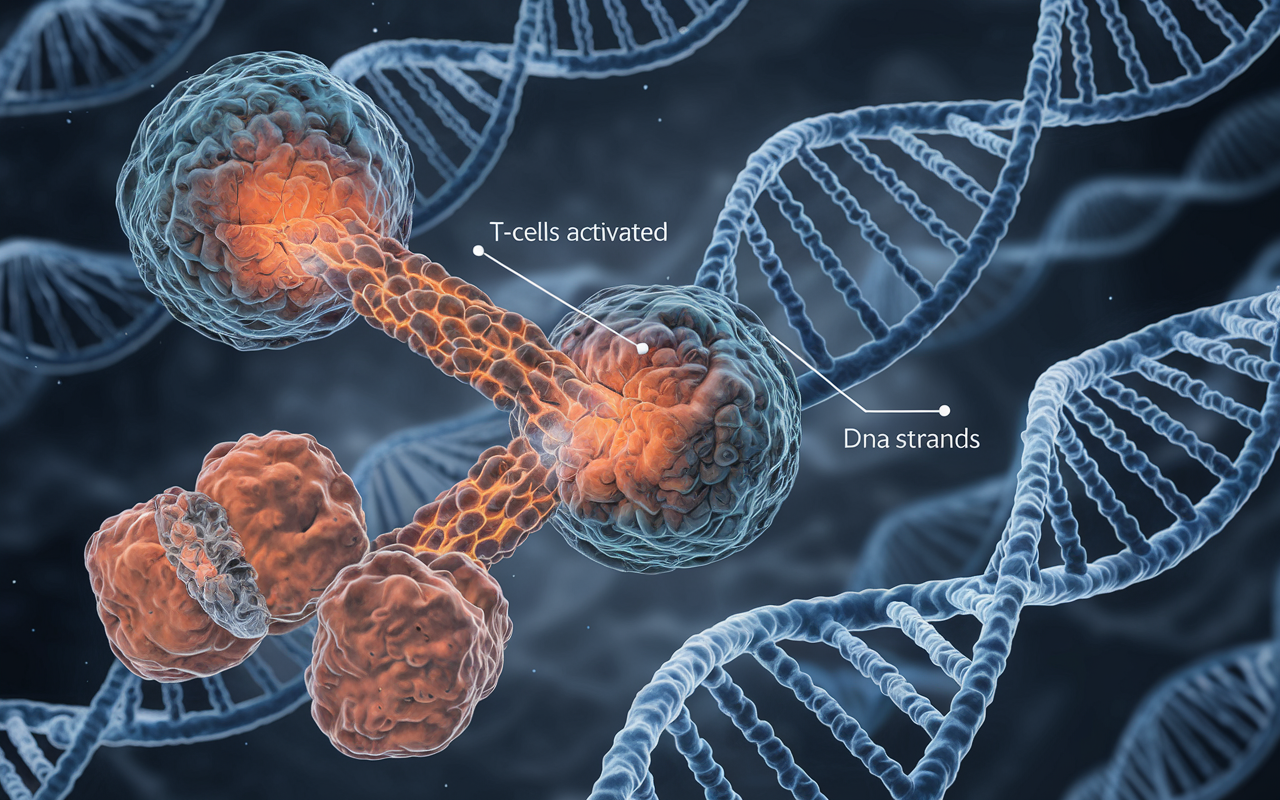Greetings, BioPharmaPulse Readers 👋
Cancer touches nearly every one of us, whether personally or through someone we know. The relentless pursuit of better treatments is a journey filled with hope and challenges. Today, we're exploring a groundbreaking advancement that could change the landscape of cancer therapy.
What's in this issue:
- 🧬 Discover how a new gene therapy is empowering the immune system against cancer.
- 🌐 Learn about global efforts to make gene therapies accessible worldwide.
- 💡 Explore the potential of RNA interference in future treatments.
- 💊 Find out why some drugs are being re-evaluated and what that means for patients.
Quote of the Day
"The science of today is the technology of tomorrow." – Edward Teller
Latest Developments
🧬 Immune-based treatment gets a boost to its cancer-fighting superpowers (2-minute read)

Rundown: Imagine if our own immune cells could be transformed into superheroes that fight cancer. That's the promise of a revolutionary gene therapy involving CAR-T cells. By genetically engineering a patient's T cells, doctors can create a personalized treatment that specifically targets and destroys cancer cells.
Key Points:
- 🧪 CAR-T Cell Therapy: Personalizes treatment by reprogramming patient's immune cells.
- ⚙️ Genetic Engineering: T cells are modified to recognize specific cancer antigens.
- 🎯 Targeted Attack: Reduces damage to healthy cells compared to traditional therapies.
- 🌟 Life-Saving Potential: Shows promise in treating blood cancers like leukemia and lymphoma.
Why it Matters: This breakthrough represents a significant step toward more effective and less harmful cancer treatments. By harnessing the body's own defenses, we move closer to therapies that offer hope to patients with previously untreatable cancers.
🌍 Jim Wilson secures $100M for global approach aimed at reviving gene therapy field (5-minute read)

Rundown: Gene therapy pioneer Jim Wilson believes that making treatments accessible worldwide is key to advancing the field. His company, GemmaBio, has partnered with Brazil’s Ministry of Health, securing up to $100 million to develop and manufacture gene therapies for rare diseases prevalent in Brazil.
Key Points:
- 🤝 Global Partnerships: Collaborating with international health ministries.
- 🧬 Focus on Rare Diseases: Targeting conditions with higher prevalence in certain regions.
- 🏭 Local Manufacturing: Building facilities to produce therapies within partner countries.
- 🌐 Expansion Plans: Aiming to replicate this model in other nations.
Why it Matters: Wilson's approach could revolutionize how gene therapies are developed and distributed, making life-saving treatments available to more patients globally and addressing unmet medical needs.
🚀 John Maraganore's RNAi biotech City Therapeutics debuts with $135M Series A (2-minute read)

Rundown: City Therapeutics, founded by biotech veteran John Maraganore, has launched with $135 million in funding. The company aims to advance RNA interference (RNAi) technology to develop new therapies that can silence disease-causing genes beyond the liver.
Key Points:
- 🧠 RNAi Technology: A method to turn off specific genes responsible for disease.
- 🏥 Broadening Targets: Seeking to deliver RNAi therapies to more tissues and cell types.
- 💰 Significant Funding: Backed by major investors for ambitious research goals.
- 📅 Clinical Plans: Aiming to file multiple Investigational New Drug (IND) applications starting in 2026.
Why it Matters: Advancements in RNAi could lead to treatments for diseases previously considered untreatable. City Therapeutics' work may pave the way for a new class of medicines with the potential to impact numerous conditions.
Question of the Day
🤔 How do you feel about the potential of gene therapy in treating cancer?
Trending
🧪 Purespring bottles up $105M series B to bring kidney disease gene therapy to the clinic
- Purespring Therapeutics is advancing gene therapies for kidney diseases, with plans to start clinical trials soon.
💉 FDA again raises doubts on Stealth's ultra-rare disease drug ahead of adcomm
- The FDA expresses concerns over the approval of a drug for Barth syndrome, highlighting challenges in rare disease treatment approvals.
🏥 Biogen to seek approval for high-dose Spinraza after unveiling new data
- Biogen is pursuing FDA approval for a higher dose of Spinraza, potentially improving outcomes for patients with spinal muscular atrophy.
Industry Insight
💡 The Future of Gene Therapy in Cancer Treatment
Gene therapy is revolutionizing how we think about treating cancer. By targeting the genetic underpinnings of the disease, therapies can be tailored to individual patients, increasing efficacy and reducing side effects.
Understanding gene therapy:
- What is it? Introducing genetic material into cells to compensate for abnormal genes or to make a beneficial protein.
- How does it work in cancer? It can target and repair mutated genes, or program immune cells to attack cancer cells.
By embracing gene therapy, we could see:
- 🔬 Personalized Medicine: Treatments designed for a patient's unique genetic makeup.
- 🛡️ Improved Safety: Reduced harm to healthy cells and tissues.
- 🌈 Hope for the Incurable: New options where traditional therapies have failed.
Quick Hits
🧬 GEMMABio secures $100M partnership with health ministry to bring rare disease gene therapies to Brazil (1-minute read)
- GemmaBio collaborates with Brazil to develop gene therapies for rare diseases, increasing global access to cutting-edge treatments.
🩺 Scholar Rock aims to raise $275M; Vincerx to reshuffle pipeline focus (1-minute read)
- Scholar Rock seeks funding to commercialize a new therapy for spinal muscular atrophy, while Vincerx reorients its drug development priorities.
💊 Sage scraps Alzheimer's program as dalzanemdor goes 0 for 2, leaving hopes resting on Huntington’s (1-minute read)
- After disappointing trial results in Alzheimer's and Parkinson's, Sage Therapeutics shifts focus to Huntington's disease research.
🌐 ViiV takes steps to widen access to HIV prevention drug, but continues to encounter criticism (1-minute read)
- ViiV Healthcare expands access to its HIV prevention medication in low-income countries, though debates over pricing and availability persist.
⚕️ Compounders sue FDA for removing Eli Lilly's tirzepatide from shortage list (2-minute read)
- A trade group challenges the FDA's decision, impacting the availability of compounded versions of a popular diabetes medication.
Wrap Up
The journey toward better health is paved with innovation, collaboration, and a relentless pursuit of knowledge. Gene therapy stands at the forefront of this movement, offering new hope against diseases like cancer. Thank you for joining us as we navigate these exciting advancements together.
Until next time,
Elliot Reeves
BioPharmaPulse
💌 How did you like today's email?
- 😍 Loved it
- 🙂 It was OK
- 😕 Could be better
